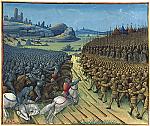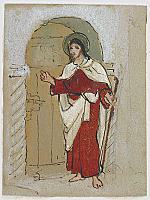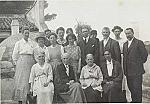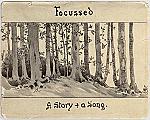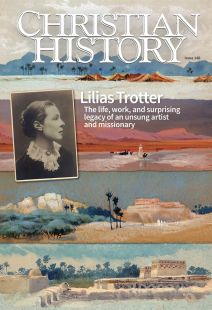God told her to go
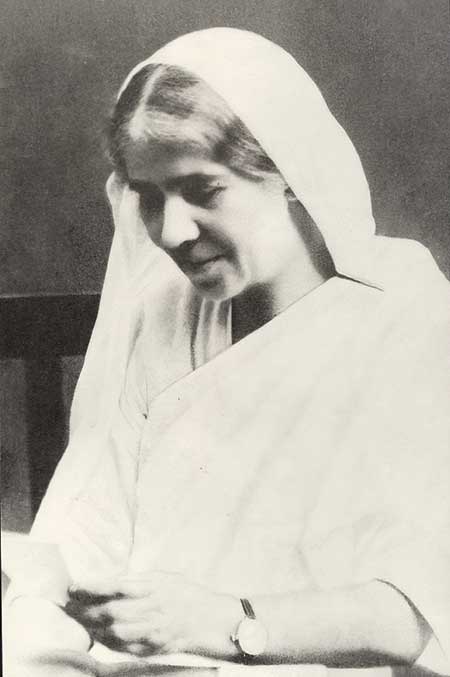
[Amy Carmichael, 20th century—Public domain, CLC Publications]
In the summer of 1928, as the 74-year-old Lilias Trotter lay dying in bed, she struggled to dictate her final letters. One was to a woman she had never met but had often corresponded with and prayed for—“Mother” Amy Carmichael of India.
Carmichael, 14 years younger than Trotter, hailed from Ireland, but their stories otherwise shared many similarities. Both had fathers who died relatively early in their lives. Both were mentored by older male colleagues. Both did extensive work with inner-city women before going abroad. Both were inspired by and involved with Keswick. Both struggled with health issues and were discouraged by missionary organizations because of their health. Both wrote prolifically and used their writing to advance their mission work.
Carmichael was the oldest of seven children born to David Carmichael and Catherine Fison Carmichael, a miller and a doctor’s daughter. She grew up near Belfast, was raised Presbyterian and educated at a Methodist boarding school, and became deeply involved with work among Belfast mill girls. Her father died in 1885; the next year she attended a Keswick-style meeting in Glasgow and in 1887 one in Belfast, where Hudson Taylor’s message inspired her.
At that same Belfast meeting, she became friends with 62-year-old Quaker industrialist Robert Wilson, one of the founders of Keswick. She lived with Wilson’s family for a few years, and though he never formally adopted her, she began using the name Amy Wilson Carmichael. In 1892 she felt she received instruction from God to simply “go.”
But where? At first Carmichael applied to the China Inland Mission, but they rejected her. Then she went to Japan on her own, then China, then Sri Lanka (Ceylon). After a brief trip home when she learned Wilson had become ill, she found an opportunity to go out with the Church Missionary Society and went to India in 1895. Although she severed ties with the CMS in 1925, she would remain in India until she died.
Nothing was casual
Carmichael’s ministry in India centered around saving women and children from child marriages and temple prostitution. After traveling with other women as a band of itinerant evangelists—she called them the “Starry Cluster”—she settled at Dohnavur in 1901, opening an orphanage and beginning ministry to former temple prostitutes. The publication of Things as They Are: Ministry in Southern India in 1903 made her work famous. The book quotes Trotter, who wrote the following blurb for it: “There is hardly a phase of all the heart-suffering retold that we have not known: page after page might have been written out here, word for word.”
The orphanage continued to grow. In 1912 the complex added a hospital, and in 1918 it began to also minister to boys (some were children of temple prostitutes). After separating from the CMS, she registered the work as the Dohnavur Fellowship in 1927.
In 1931 Carmichael broke her leg—a seemingly minor injury at the time, but one she never recovered from. Confined mostly to her room, she continued writing—there would be 35 books in all—and mentoring visitors. A second fall in 1948 (coincidentally, the same year that India outlawed temple prostitution) spelled the beginning of the end. She died in 1951 and was buried at Dohnavur. The Dohnavur Fellowship still exists, entirely under Indian leadership; it runs the orphanage, the hospital, a dairy farm, and several educational endeavors.
One of Carmichael’s biographers, Eric Sharpe, said of her in 1996, “Amy Carmichael was nothing if not earnest. Nothing about her was, or ever had been, light or casual.” Her single-minded devotion touched the lives of thousands—including Trotter—and left a profound example for others to follow. CH
By Jennifer Woodruff Tait
[Christian History originally published this article in Christian History Issue #148 in 2023]
Jennifer Woodruff Tait is managing editor of Christian History.Next articles
Reaching the “Brotherhood men”
Trotter’s evangelization of Sufi Muslims fit within a larger context of Muslim-Christian relations
Edwin Woodruff TaitArtists, angels, apostles, and the abode of peace
Some of Trotter’s friends, colleagues, and mentors
Jennifer Boardman“Turn full your soul’s vision to Jesus”
An ocean of grace and love and power lying all around us
Lilias Trotter



